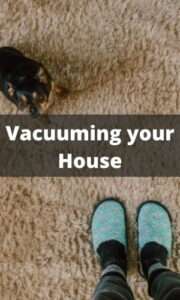
In the quest for a cleaner home, one fundamental question arises: How often should you vacuum? Discover the optimal cleaning frequency that keeps your space fresh and allergen-free. Learn practical tips to maintain a tidy environment effortlessly. Read on to find out how regular vacuuming can transform your living space!
In this post we will cover:
- The Importance of Vacuuming
- How Often to Vacuum Your House
- Factors to consider before deciding on a vacuuming interval
- How should I clean different types of flooring?
- What happens if I never vacuum?
The Importance of Vacuuming
Vacuuming is essential for maintaining a clean, healthy environment by reducing dust, lint, and allergens trapped in carpets and floors. It helps eliminate odors and extends the lifespan of carpets by preventing fiber damage.
Regular vacuuming also prevents the buildup of bacteria and fungi, promoting a safer living space, especially for those with allergies or asthma. Modern vacuum cleaners offer effective filtration and cleaning options, ensuring thorough sanitation throughout your home.
How Often to Vacuum Your House
1. Daily Vacuuming in High Traffic Areas
Daily vacuuming is crucial for high traffic areas such as entryways, living rooms, and hallways. These areas accumulate dirt, dust, and debris quickly. Regular vacuuming prevents these particles from embedding deep into carpets and helps maintain a clean and inviting space.
2. Twice Weekly for Medium Traffic Areas
Areas like bedrooms, family rooms, and dining rooms, which experience moderate foot traffic, should be vacuumed at least twice a week. This frequency ensures that dirt and allergens are regularly removed, promoting a healthier indoor environment.
3. Weekly Vacuuming for Low Traffic Areas
Spaces with minimal use such as guest rooms, formal dining rooms, and home offices can be vacuumed once a week. Even though these areas see less foot traffic, regular vacuuming prevents dust buildup and keeps the space fresh.
4. Vacuum Upholstered Furniture Every 1-2 Weeks
To maintain the cleanliness of upholstered furniture, vacuum it every 1-2 weeks. Use a vacuum cleaner with appropriate attachments to reach into crevices and under cushions, where dust, pet hair, and crumbs tend to accumulate.
5. Monthly Vacuuming of Drapes and Curtains
Drapes and curtains collect dust and allergens over time. Vacuum them monthly to keep them clean and maintain air quality in your home. Use a soft brush attachment or a handheld vacuum for delicate fabrics.
6. Vacuuming Frequency for Different Floor Types
Adjust vacuuming frequency based on the type of flooring:
- Hardwood Floors: Vacuum weekly to remove dust and debris. Be cautious with vacuum settings to avoid scratching.
- Tile and Laminate Floors: Vacuum once or twice a week, focusing on high traffic areas. Use a vacuum with a hard floor setting or a soft brush attachment.
- Carpeted Areas: Vacuum at least weekly. Consider more frequent vacuuming in high traffic areas to prevent matting and extend carpet life.
7. Vacuum Carpets and Rugs Before Deep Cleaning
Before deep cleaning carpets and rugs, it’s essential to vacuum thoroughly. This initial vacuuming removes surface dirt and debris, allowing for more effective deep cleaning and ensuring better results.
8. Seasonal Cleaning for Hard-to-Reach Areas
Plan for seasonal deep cleaning of hard-to-reach areas such as baseboards, behind furniture, and under beds. These areas accumulate dust and dirt over time and benefit from a thorough vacuuming to maintain cleanliness throughout your home.
9. Use HEPA Filters for Allergy Control
Choose a vacuum cleaner equipped with HEPA (High-Efficiency Particulate Air) filters. HEPA filters trap small particles such as dust mites, pollen, and pet dander, improving indoor air quality and making vacuuming more effective for allergy control.
FAQs
1: How often should I vacuum if I have pets?
If you have pets, increase the frequency of vacuuming, especially in areas they frequent. Aim for daily vacuuming in high traffic zones and every other day for pet-specific areas to minimize fur buildup and allergens.
2: Can vacuuming too often damage carpets?
Vacuuming daily or multiple times a week in high traffic areas shouldn’t damage carpets if done correctly. Use a vacuum cleaner with adjustable height settings and proper technique to avoid wear and tear.
3: Is vacuuming enough to keep my home clean?
While vacuuming is essential, it’s best complemented with regular dusting, mopping, and occasional deep cleaning. These additional cleaning methods help maintain overall cleanliness and hygiene in your home, ensuring a healthy living environment for you and your family.
4: Factors to consider before deciding on a vacuuming interval
Maintaining a clean home involves vacuuming tailored to your specific needs. For homes with rugs, twice-weekly vacuuming is recommended to combat grime and bacteria buildup. Carpeted floors require more frequent cleaning due to dust retention, while hard floors suffice with twice-weekly sessions. Pet owners should vacuum daily to manage shedding and dirt brought indoors.
5: How should I clean different types of flooring?
Maintaining different types of flooring requires specific care routines. For concrete, use a pressured washer and paint stripper for stains. Tile needs weekly cleaning with a proper cleaner and grout scrubbing.
Carpet should be vacuumed regularly and spot-cleaned promptly. Vinyl requires gentle cleaners to preserve its coating, while hardwood needs sweeping and occasional natural cleaning to retain its finish and durability.
6: What happens if I never vacuum?
Regular vacuuming is crucial for maintaining a clean and healthy home environment. It reduces dust mites, allergens, and mold, prolongs carpet life, and prevents bed bug infestations. Neglecting vacuuming can lead to allergies, carpet damage, mold growth, and potential bed bug issues, impacting both cleanliness and comfort.
The Wind-Up
Regular vacuuming is crucial for a clean home and healthy environment. By vacuuming at least once a week, you can effectively remove dirt, allergens, and pet hair from your floors and carpets. This routine maintenance not only keeps your home looking its best but also contributes to a fresher, more comfortable living space for you and your family. So, keep that vacuum handy and make it a habit!
